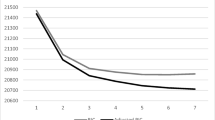Abstract
The purpose of this study is to assess postsecondary students' beliefs about the nature of knowledge and learning, or epistemological beliefs. Comparisons were made between junior college students and university students and between technological science majors and social science majors on their degree of belief in simple knowledge, certain knowledge, innate ability, and quick learning. Junior college students were more likely to believe in simple, certain knowledge, and quick learning. University students were more likely to believe in innate ability. Technological science majors were more likely to believe in quick learning. Background variables, such as age, gender, and parental education, also contributed to differences between groups. Two-year institutions, as well as four-year institutions, might want to consider students' epistemological beliefs as possible factors affecting academic performance, attrition rate, and transfer difficulties.
Similar content being viewed by others
References
Anderson, R. C. (1984). Some reflections on the acquisition of knowledge.Educational Researcher 13(9): 5–10 (November).
Astin, A. (1977).Four Critical Years. San Francisco: Jossey-Bass.
Bauer, K. W., Mitchell, F. R., and Bauer, P.F., (1991). Students' perceptions of selected academic and personal characteristics acquired at community colleges.College and University 67(1): 65–71.
Beers, S. E. (1988). Epistemological assumptions and college teaching: Interactions in the college classroom.Journal of Research and Development in Education 21(4): 87–93.
Bransford, J. D., Barclay, J. R., and Franks, J. J. (1972). Sentence memory: A constructive versus interpretive approach.Cognitive Psychology 3: 193–209.
Brown, A. L. (1988). Motivation to learn and understand: On taking charge of one's own learning.Cognition and Instruction 5(4): 311–321.
Carter, T. P., and Segura, R. D. (1979).Mexican Americans in School: A Decade of Change. New York: College Examination Board.
Cohen, A., Brawer, F., and Bensimon, E. (1985).Transfer Education in American Community Colleges. Los Angeles: ERIC Document Reproduction Service No. ED 255 250.
Craik, F., and Lockhart, R. (1972). Levels of processing: A framework for memory research.Journal of Verbal Learning and Verbal Behaviors 11: 671–684.
Cross, K. (1971).Beyond the Open Door: New Students to Higher Education. San Francisco: Jossey-Bass.
Dell, P. F. (1980). The Hopi family therapist and the Aristotelian parents.Journal of Marital and Family Therapy 6(2): 123–130.
Dweck, C. S., and Leggett, E. L. (1988). A social-cognitive approach to motivation and personality.Psychological Review 95: 256–273.
Gay, G. (1978). Viewing the pluralistic classroom as a cultural microcosm.Educational Research Quarterly 2(4): 45–49.
Glenberg, A. M., and Epstein, W. (1987). Inexpert calibration of comprehension.Memory and Cognition 15(1): 84–93.
Hsu, F. (1982).Chinese and Americans. Honolulu: University of Hawaii Press.
John, V. P. (1985). Styles of learning—styles of teaching: Reflections on the education of Navajo children. In B. Cazden, V. P. John, and D. Hymes (eds.),Functions of Language in the Classroom. Prospect Heights, IL: Waveland Press.
King, P. M., Kitchener, K. S., Davison, M. L., Parker, C. A., and Wood, P. K. (1983). The justification of beliefs in young adults: A longitudinal study.Human Development 26: 106–116.
McPeck, J. E. (1984).Critical Thinking and Education. New York: St. Martin's.
Pai, Y. (1990).Cultural Foundations of Education. Columbus: Merrill Publishing Company.
Perry, W. G., Jr. (1968).Patterns of Development in Thought and Values of Students in a Liberal Arts College: A Validation of a Scheme. Cambridge, MA: Bureau of Study Counsel, Harvard University (ERIC Document Reproduction Service No. ED 024315).
Ryan, M. P. (1984). Monitoring text comprehension: Individual differences in epistemological standards.Journal of Educational Psychology 76: 248–258.
Schommer, M. (1988, April). Dimensions of tacit epistemology and comprehension. Paper presented at the annual conference of the American Educational Research Association, New Orleans.
Schommer, M. 1990. Effects of beliefs about the nature of knowledge on comprehension.Journal of Educational Psychology 82(3): 498–504.
Schommer, M., Crouse, A., and Rhodes, N. (1992). Epistemological beliefs and mathematical text comprehension: Believing it's simple doesn't make it so.Journal of Educational Psychology 84(4): 435–443.
Schommer, M., and Dunnell, P. A. (1992). Epistemological beliefs among gifted and non-gifted students. Paper presented at the annual meeting of the American Educational Research Association. San Francisco, California.
Toulmin, S. (1976).Knowing and Acting: An Invitation to Philosophy. New York: Macmillan.
Unger, K. R., Draper, R. D., and Pendergrass, M. L. (1986). Personal epistemology and personal experience.Journal of Social Issues 42(2): 67–79.
Author information
Authors and Affiliations
Rights and permissions
About this article
Cite this article
Schommer, M. Comparisons of beliefs about the nature of knowledge and learning among postsecondary students. Res High Educ 34, 355–370 (1993). https://doi.org/10.1007/BF00991849
Issue Date:
DOI: https://doi.org/10.1007/BF00991849




